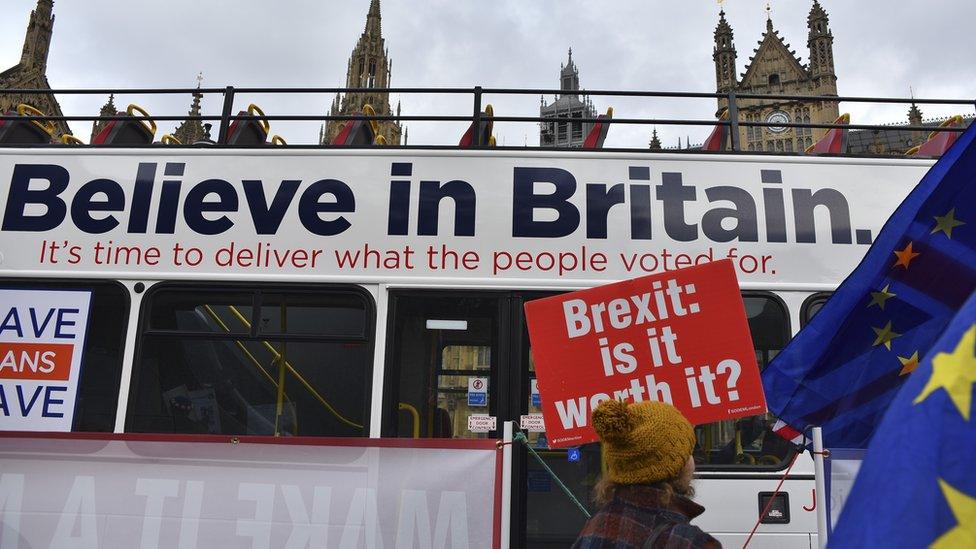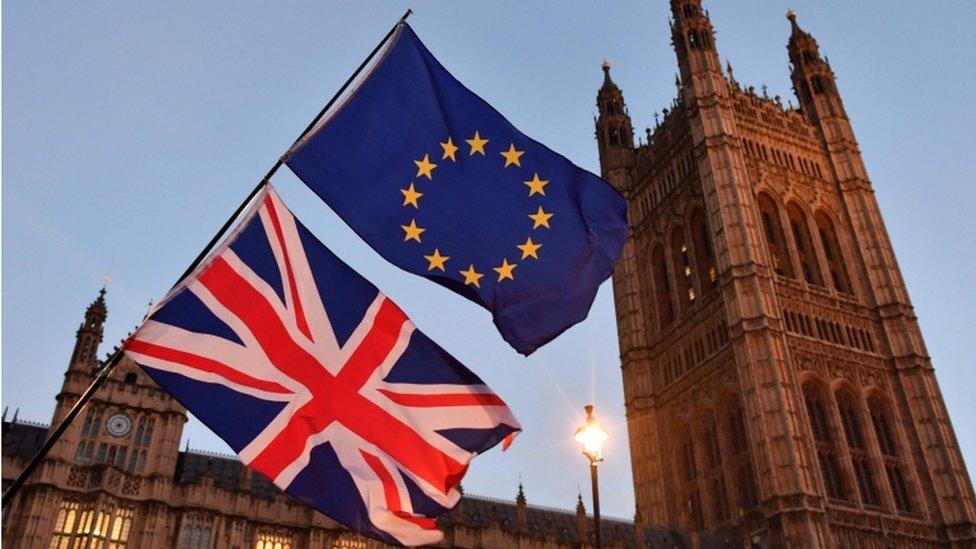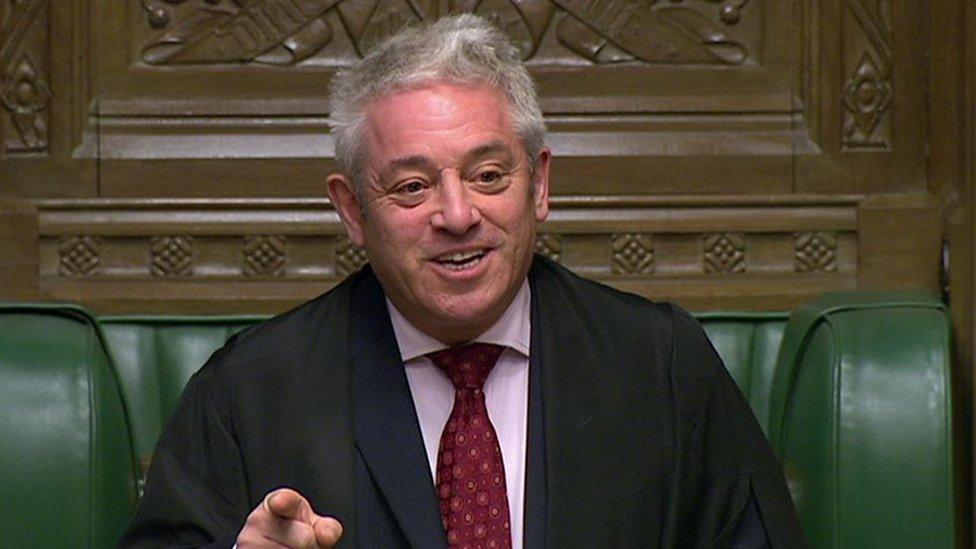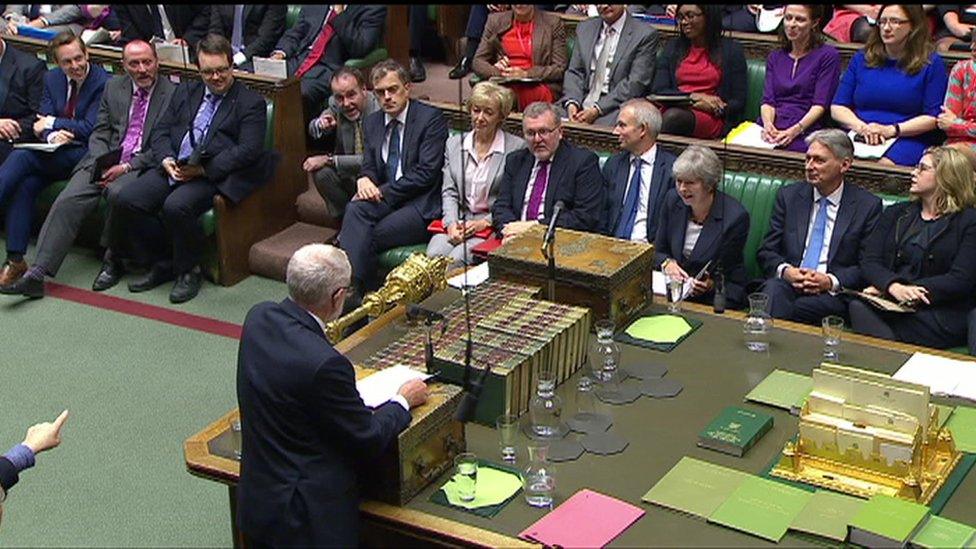Week ahead in Parliament
- Published
- comments

Pro and anti-Brexit campaigners stage protests at Westminster
It is pretty difficult to produce hard predictions about this week's events in Parliament - the reality is that everything orbits around the big Brexit vote in the Commons on Tuesday, and the reverberations which will follow.
The possibilities include everything from a surprise government victory to a crushing Commons humiliation. It could also mean that much of the subsequent parliamentary schedule is scrubbed out and replaced.
Here's what I know at the moment (with the health warning that it is all even more changeable than usual).
Monday 10 December
The Commons opens (2.30pm) with Housing, Communities and Local Government questions, and any post-weekend ministerial statements or urgent questions will then follow.
One possible subject might be a ruling by the European Court on whether the UK has the right to unilaterally withdraw its Article 50 notice (of intent to leave the EU). The ruling is due at 8am on Monday morning and Joanna Cherry, the SNP MP who is one of the backers of the case on which the Court will rule, has already called for ministers to make a statement in response.
Then MPs will move on to day four of their debate on the Brexit deal, where the theme is "the Union". David Lidington, the de facto deputy prime minister will open for the government, with Northern Ireland Secretary Karen Bradley winding up - and while the theme is only binding for the frontbench speakers, expect the DUP, the SNP and perhaps the small but important band of Scottish Conservatives, to weigh in very heavily.
Brexit: Can Theresa May win over MPs?
The adjournment debate, led by Croydon Labour MP Sarah Jones, is on tram safety - it comes almost exactly a year after accident investigators made a series of recommendations for improving tram safety across the country in the wake of the Croydon tram crash, in which seven people died and 61 were injured - the worst tram disaster for a century and the worst rail accident for 17 years.
Sarah Jones is critical of ministers for failing to make a single statement in the year since the report to update MPs on tram safety and measures to implement the recommendations.
One point to note here is that the deadline for putting down amendments for the Brexit debate is the close of business on Monday - so it is possible that if MPs run out of steam and the fourth day of debate peters out early, the adjournment debate might start early and be kept running for as long as possible; so if MPs suddenly develop an unexpected interest in tram safety, it might be because someone, in some back room, is drafting some last-minute amendment.
In Westminster Hall (4.30pm) MPs debate e-petition 219758, external calling for a ban on the sale of products containing unsustainably produced palm oil - the petition, which has almost 90,000 signatories, warns that palm oil production damages tropical rain-forests and has already led to the death of thousands of orangutans. The government response is that it is working towards 100% sourcing of credibly certified sustainable palm oil.

In the Lords (2.30pm) the main event is day three of peers' EU Withdrawal Agreement debate - with votes expected after 8pm on the Labour leader, Baroness Smith of Basildon's amendment, which condemns the government's deal as economically damaging and warns that a no deal outcome to negotiations "must be emphatically rejected".
There's even an amendment to that amendment from the former Cabinet secretary Lord Butler, deleting the bit of the Labour motion which attacks the government's deal, and keeping only the warning about no-deal.
Finally, there's more Brexit; a Labour motion to regret the UK's withdrawal from the European Atomic Energy Community.
Tuesday 11 December
A fateful Commons day opens (11.30am) with Treasury questions.
I suspect it would take a pretty huge development to interrupt business with an urgent question or statement, and so MPs will probably more on to the Lib Dem former health minister, Norman Lamb's Ten Minute Rule Bill on Cannabis (Legalisation and Regulation) - he says he has many constituents who had hoped to benefit from the government's decision to license the medicinal use of cannabis for pain relief, but the process has proved a dead end.
He wants the UK to follow the example of Canada, and allow people to buy a safe, regulated (and taxed) product, where the dosage would by low enough to avoid damage to mental health.
Then the main event - the conclusion of the debate on the Brexit deal, external.

Listen out, first, for Mr Speaker's selection of amendments, which will determine the options MPs actually vote on - and bear in mind that passing some amendments forecloses others - so passing an amendment to reject the government's entire deal, for example, would mean that proposals to alter the precise nature of the Northern Ireland backstop would not then be voted on.
The voting should start at 7pm, and, depending on the number of amendments which were actually put to the vote, would probably be done by 9pm.
The timing is a bit vague, because everything would be pushed back, if there was a statement or urgent question, earlier in the day - and because the way the process unfolds depends on the Speaker's choice of amendments.....
And there is also the possibility (repeatedly denied by Downing Street) that the government might dodge the vote. They could do this by putting down a new Business of the House motion to reschedule it, or they could simply keep talking past 7pm, at which point no vote would be held - in effect, they would talk the debate out, rather in the way private members bills are regularly defeated. (Interestingly, the Business of the House motion which structured the current debate includes a requirement that only a minister can trigger the voting....)
If the votes are held and the government loses, the really critical moment will come when the prime minister responds. Will she announce a new policy? Will she reserve her response to the next day? Jeremy Corbyn would also have the chance to say something, and might announce a No Confidence motion against the government (an option he might also take if the vote is pulled).
The argument against such a move is that it might give the Conservatives a cause to re-unite around - and there is nothing to stop the Labour leader holding fire for a while to see what happens next.
Finally, the day ends on a workaday note, with an adjournment debate from the Conservative, Dan Poulter, on private parking enforcement at commercial ports and trading estates.
In Westminster Hall there are a couple of significant debates. First, (9.30am) the former deputy leader of the House, Chris Bryant leads a debate on the House of Commons Financial Plan 2019-20 to 2022-23, external and draft Estimates for 2019-20 - in effect, on the Commons' spending plans.
Debates like this used to be an annual event, but have rather fallen out of fashion in recent years; Mr Bryant argues that this provide an opportunity to question the way the multi billion pound budget of the Commons is allocated, particularly as the major spending on the Restoration and Renewal project, to refurbish Parliament's crumbling Victorian home, gathers pace. A Treasury minister will respond.
In the afternoon, (2.30pm) there's an interesting Brexit sideshow, with Labour MP Laura Smith leading a debate on "State aid, public ownership and workers rights after the UK leaves the EU".
This looks like a debate on the left wing case for Brexit, as a way of allowing socialist policies that would otherwise be prevented by EU rules. Ms Smith resigned from the Labour frontbench to vote against the UK joining the European Economic Area (EEA), saying: "I will not vote for any amendment to Brexit legislation that does not deliver the exit from the European Union that my constituents voted for."
In the Lords (2.30pm) the usual half hour question time is followed by the third reading of the Mental Capacity (Amendment) Bill, which revamps the rules for care of people who have to be deprived of their liberty. The remaining issue is a promised government concession on the process for raising concerns about the care of a person in a care home. Then comes the report stage of the Tenants Fees Bill, where the issues in play include rent default fees and /or repairs and damages, rent deposit passporting, and lowering the transition period for implementation from one year to six months.
Following this are some orders on age-verification and online pornography that Labour's Lord Stevenson has a regret motion down on, and then the Conservative historian, Lord Lexden, leads a debate on Operation Conifer and the allegations of child sex abuse against Sir Edward Heath - peers have repeatedly criticised the handling of this £1.1m investigation and have been pressing the government for an independent inquiry into its conduct
In this debate Lord Lexden will argue, not for full inquiry, but for an independent assessment of the allegations which would have been the subject of questions to the former prime minister under caution, if he had been alive.
Wednesday 12 December

The morning after the night before, the Commons opens (11.30 am) with Northern Ireland questions, which may well provide an appetiser for Prime Minister's Questions at noon.
It is entirely possible, that there may be a No Confidence Motion taking precedence over later business, in which case PMQs will, in effect, become the opening act to that debate.
The day's Ten Minute Rule Bill, from up and coming Conservative, James Cleverly, calls for the creation of an International Trade and Development Agency, to promote the idea that developing countries can trade their way out of poverty. It would seek to join up the work of the Department for International Development and the Department for International Trade - although Mr Cleverly insists it will not lead to any suggestion of "aid for trade".
MPs are also scheduled to look at Lords amendments to the Ivory Bill before moving on to a general debate on Fuel Poverty.
In the Lords (3pm) peers are expected to give final approval to two Commons private members' bills: the Health and Social Care (National Data Guardian) Bill and the Prisons (Interference with Wireless Telegraphy) Bill before debating the detail of two more - the Homes (Fitness for Human Habitation) Bill, and the Organ Donation (Deemed Consent)Bill.
But there may not be much to debate; as I write there are no amendments proposed; to either bill and if none appear, they will move on to third reading, probably before Christmas.
The main debates are on a report from the Science and Technology Committee 'Off-site manufacture for construction: Building for change, external' which highlights the potential for new generation prefabricated homes to help address the UK's housing crisis.
The next is on the 250th anniversary of the founding of the Royal Academy of Arts - when King George III signed the Instrument of Foundation, thereby founding the Royal Academy, with the aim of establishing a "well-regulated School or Academy of Design, for the use of students in the Arts, and an Annual Exhibition, open to all artists of distinguished merit".
The Conservative, Lord Cormack, leads the debate.
Thursday 13 December
MPs open (9.30am) with Digital, Culture, Media and Sport questions, followed by questions to the Attorney General (10.10am) and then Business Questions to the Leader of the House, Andrea Leadsom.
The main event is a general debate on a Public Health Model to reduce youth violence.
This is a government debate - there is some grumbling that the government has not allocated time for backbench debates, even though the Backbench Business Committee has a backlog of subjects MPs wish to discuss; there are mutterings that ministers don't want to provide backbench debating time, because it would mean they then had to allocate Opposition Days as well, and that might provide Labour with a chance to do something unhelpful at some critical moment in the Brexit process.
In Westminster Hall, Labour MP Kate Green leads a debate (1.30pm) on protection for homebuyers - which will cover both rights in the event that new build properties are found to have defects and the issue of unfair leasehold arrangements.
In the Lords (11am), the usual question time will be followed by a debate on establishment of a UK-wide Constitutional Convention to address issues of democratic accountability and devolution, especially in England - this is the brainchild of the Labour ex-minister Lord Foulkes of Cumnock who will be arguing that devolution in England is piecemeal and the UK needs a coherent and comprehensive scheme, perhaps including a Senate of the Nations and Regions to replace the Lords.
He wants the government to set up a UK Convention, but also argues that if they won't, Labour should take the initiative.
There will also be debates on the role of the government's 'Strategy for Disability Inclusive Development' towards meeting the UK's commitments given at the Global Disability Summit and on the challenges facing young people.
Friday 14 December
The Commons will not be sitting (at least, according to current plans) but in the Lords it's the Archbishop of Canterbury 's annual Friday debate (10am).
The Archbishop of Canterbury says there could be "moment of opportunity" for Middle East peace efforts
This year his focus will be on the role of reconciliation in British foreign, defence and international development policy. Archbishop Justin Welby is intending to champion the benefits of reconciliation (by which he means a framework of tools - mediation, restorative justice, arbitration etc - to transform violent conflict into non-violent disagreement), the importance of recognising and honouring the 'other' and disagreeing well, as an approach to British foreign policy.
He wants to discuss the potential of reconciliation to be a cross-departmental, cross-societal approach to transform the nature of conflict and create a sustainable framework of peace. This will include a Christian angle of the idea of "ultimate reconciliation with God", whilst accepting that in a human world reconciliation is a difficult, long-term process as well as a goal.
There'll be acknowledgement of the collaborative role that governments, NGOs and faith-based organisations all have to play, as do those directly in the affected communities. Earlier in his Church career he was the Canon for Reconciliation at Coventry Cathedral, and spent many years personally mediating in violent conflicts abroad.